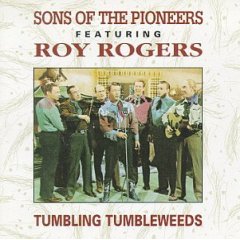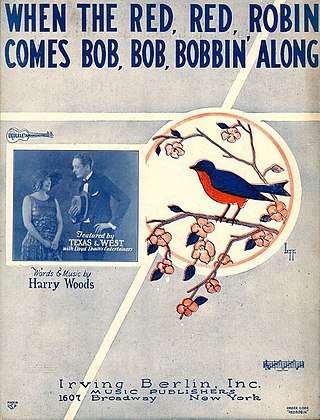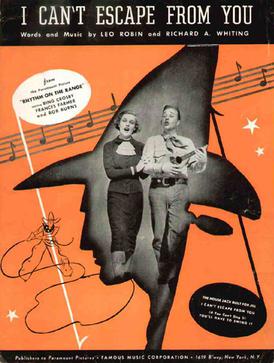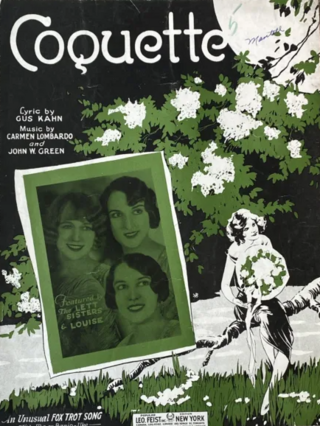Related Research Articles

"Back in Your Own Backyard" is a popular song. Officially the credits show it as written by Al Jolson, Billy Rose, and Dave Dreyer; in fact, Billy Rose was exclusively a lyricist, Dreyer a composer, and Al Jolson a performer who was often given credits so he could earn some more money, so the actual apportionment of the credits would be likely to be music by Dreyer, lyrics by Rose, and possibly some small contribution by Jolson.
"A Hundred Years from Today" is a popular song published in 1933 with music by Victor Young and lyrics by Ned Washington and Joe Young. The song was included in the London production of Lew Leslie's Blackbirds of 1934.
"Isle of Capri" is a popular song. The music, a tango foxtrot, was written by Wilhelm Grosz, with lyrics by Jimmy Kennedy and was published in 1934. Ray Noble and his Orchestra with vocalist Al Bowlly, recorded it in London, UK, on August 30, 1934. It was released in November on Victor Records in the United States, reaching number one for seven weeks in early 1935.
"Painting the Clouds with Sunshine" is a popular song published in 1929. The music was written by Joe Burke and the lyrics by Al Dubin for the 1929 musical film Gold Diggers of Broadway when it was sung by Nick Lucas. Gold Diggers of Broadway is a partially lost film, and the scene featuring the song is one of the only surviving scenes of the movie.

"I'll Get By (As Long as I Have You)" is a popular song with music by Fred E. Ahlert and lyrics by Roy Turk that was published in 1928. Versions by Nick Lucas, Aileen Stanley and, most successfully, Ruth Etting, all charted in America in 1929.
"Don't Take Your Love from Me" is a popular song written by Henry Nemo and published in 1941. Mildred Bailey first recorded this song in 1940 before publication. It was introduced that year by singer Joan Brooks.

"Somebody Loves Me" is a popular song, with music written by George Gershwin, and lyrics by Ballard MacDonald and Buddy DeSylva. The song was published in 1924 and featured in George White's Scandals of 1924.

"The Gold Diggers' Song " is a song from the 1933 Warner Bros. film Gold Diggers of 1933, sung in the opening sequence by Ginger Rogers and chorus. The entire song is never performed in the 1933 movie, though it introduces the film in the opening scene. Later in the movie, the tune is heard off stage in rehearsal as the director continues a discussion on camera about other matters.
"I've Got a Crush on You" is a song composed by George Gershwin, with lyrics by Ira Gershwin. It is unique among Gershwin compositions in that it was used for two different Broadway productions: Treasure Girl (1928), when it was introduced by Clifton Webb and Mary Hay, and Strike Up the Band (1930), when it was sung by Doris Carson and Gordon Smith. It was later included in the tribute musical Nice Work If You Can Get It (2012), in which it was sung by Jennifer Laura Thompson. When covered by Frank Sinatra he was a part of Columbia Records.

"Nobody's Sweetheart", also known as "Nobody's Sweetheart Now" and "You're Nobody's Sweetheart Now", is a popular song, written in 1924, with music by Billy Meyers and Elmer Schoebel, and lyrics by Gus Kahn and Ernie Erdman. The song is a jazz and pop standard.

"Everybody Loves My Baby", also known as "Everybody Loves My Baby, but My Baby Don't Love Nobody but Me", is a popular and jazz standard song composed by Spencer Williams in 1924. Lyrics were written by Jack Palmer.
"(You'd Be So) Easy to Love" is a popular song written by Cole Porter for William Gaxton to sing in the 1934 Broadway show Anything Goes. However Gaxton was unhappy about its wide vocal range and it was cut from the musical. Porter re-wrote it for the 1936 film Born to Dance, where it was introduced by Eleanor Powell, James Stewart, and Frances Langford under its alternate title, "Easy to Love". The song was later added to the 1987 and 2011 revivals of Anything Goes under the complete title "You’d Be So Easy to Love".

"Tumbling Tumbleweeds" is a Western music song composed by Bob Nolan, a founding member of the Sons of the Pioneers. Nolan wrote the song in the early 1930s while he was working as a caddy and living in Los Angeles. It was first recorded by the Sons of the Pioneers in 1934, and it became one of the most famous songs associated with the group. Originally titled "Tumbling Leaves", the song was reworked into the title "Tumbling Tumbleweeds" and into more widespread fame with the 1935 film of the same name starring Gene Autry. Members of the Western Writers of America chose it as one of the Top 100 Western songs of all time.
Liza (All the Clouds'll Roll Away)" is a song composed by George Gershwin with lyrics by Ira Gershwin and Gus Kahn. It was introduced in 1929 by Ruby Keeler (as Dixie Dugan) in Florenz Ziegfeld's musical Show Girl. The stage performances were accompanied by the Duke Ellington Orchestra. On the show's opening night in Boston on June 25, 1929, Keeler's husband and popular singer Al Jolson suddenly stood up from his seat in the third row and sang a chorus of the song, much to the surprise of the audience and Gershwin himself. Jolson recorded the song a few days later on July 6, 1929, and his rendition rose to number nine on the charts of the day.
"For You" is a song written by Joe Burke and Al Dubin in 1930. It was introduced in the Mack Sennett short Billboard Girl (1932) when it was sung by Bing Crosby. The best known version was from musician Rick Nelson in 1964, when it peaked at #6 on the Billboard Hot 100 and at #66 on the year end.

"When the Red, Red Robin " is a popular song written, both words and music, by Harry Woods in 1926. The song became the signature song for singer and actress Lillian Roth, who performed it often during the height of her musical career from the late 1920s to the late 1930s.
"Can't We Be Friends?" is a 1929 song with lyrics by Paul James and music by Kay Swift, introduced on Broadway in The Little Show by Libby Holman. It was later recorded by many artists including Bing Crosby, Ella Fitzgerald, and Frank Sinatra.

"I Can't Escape from You" is a song written music by Richard A. Whiting and lyrics by Leo Robin for the 1936 Paramount Film "Rhythm on the Range", and first introduced in the film when Bing Crosby sang it to Frances Farmer. Crosby recorded it for Decca Records that same year with the Jimmy Dorsey Orchestra and it was in the hit parade for 11 weeks reaching a peak position of No. 7. Crosby recorded the song again in 1954 for his album Bing: A Musical Autobiography.
"Blue Turning Grey over You" is a 1929 jazz standard. The music was composed by Fats Waller, with lyrics by Andy Razaf. Fats Waller recorded the song for Victor Records on June 9, 1937.

"Coquette" is a 1928 fox trot jazz standard. It was composed by Johnny Green and Carmen Lombardo, with lyrics by Gus Kahn. Guy Lombardo had great success with the song in 1928.
References
- ↑ Sullivan, Henry (1929-01-01). "I May Be Wrong". Sheet Music Collection.
- ↑ "Broadway World". broadwayworld.com. Retrieved December 4, 2017.
- ↑ Green, Stanley (1980). Encyclopedia of the Musical Theatre . New York: Da Capo. ISBN 0306801132.
- ↑ "Worcester Songwriters of the Great American Songbook". worcestersongs.blogspot.co.uk. Retrieved December 5, 2017.
- ↑ "The Online Discographical Project". 78discography.com. Retrieved December 5, 2017.
- ↑ "The Online Discographical Project". 78discography.com. Retrieved December 5, 2017.
- ↑ "The Online Discographical Project". 78discography.com. Retrieved December 5, 2017.
- ↑ "The Online Discographical Project". 78discography.com. Retrieved December 5, 2017.
- ↑ "The Online Discographical Project". 78discography.com. Retrieved December 5, 2017.
- ↑ "Judy Garland Discography". thejudyroom.com. Retrieved December 4, 2017.
- ↑ "The Online Discographical Project". 78discography.com. Retrieved December 4, 2017.
- ↑ "The Online Discographical Project". 78discography.com. Retrieved December 4, 2017.
- ↑ "Discogs.com". Discogs.com. Retrieved December 4, 2017.
- ↑ "A Bing Crosby Discography". BING magazine. International Club Crosby. Retrieved December 3, 2017.
- ↑ "allmusic.com". allmusic.com. Retrieved December 4, 2017.
- ↑ "Discogs.com". Discogs.com. Retrieved December 4, 2017.